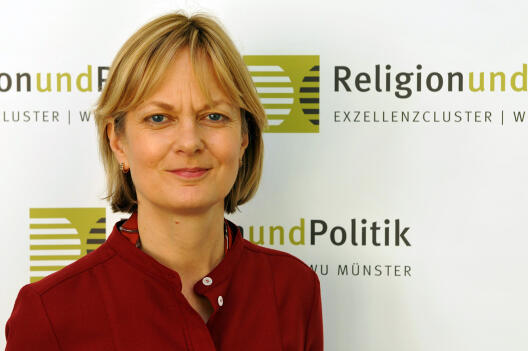“Those unaffiliated with any religion often are not strictly atheistic”
Blumenberg visiting professor Woodhead on the increasing group of those unaffiliated with religion

Press release of the Cluster of Excellence from 9 May 2017
Most of those unaffiliated with religion in Europe, the “nones”, are not strictly atheistic according to the British sociologist of religion Prof. Dr. Linda Woodhead. “The group of those who do not belong to an organised religion is growing in many European countries,” says the Hans Blumenberg visiting professor at the Cluster of Excellence “Religion and Politics” of the University of Münster on Monday evening. “However, a likewise increasing rejection of faith and spirituality is not a consequence thereof.” Only 13 percent of the “nones” in Great Britain followed the “New Atheism” by evolutionary biologist Richard Dawkins. In addition to that, only 42 percent of the British people stating that they did not belong to any religious community are strongly convinced that there is no god. “A good 16 percent of them are sure or think it is probable that god or a higher power exists.” The lecture was called: “Is ‘No Religion’ the New Religion?”.
“Ecclesial bonds are replaced more and more by individualistic and syncretistic forms of religion,” the sociologist of religion explains. About a quarter of the “nones” cultivates their own spiritual practices in the private home. “If you want to be buried in England or Germany today, you can choose among many hybrid Christian-secular forms.” A few decades ago Christian rituals were the norm. “Today, ‘no-religion rituals’ or hybrid forms are normal. They have become the norm with which most people feel comfortable with.” In England, the number of “nones” within the population was at a third a good 30 years ago. Today, half of the people state that they do not belong to any religion. “The world-wide comparison shows that such developments take place particularly in liberal democracies where the majority used to be Christian,” says Woodhead, “for instance in Germany, France, the Netherlands, Australia or the USA. In most of the other countries it is still the norm to belong to a religious community.”
The Blumenberg visiting professor explained that the group of the “nones” attached great importance to the independence of individual convictions, many of the “nones” said for example “I am Christian in my way.” Surveys state that 63 percent of the British people would listen to their own reason or intuition when making decisions, only 6 percent listened to God or a higher power and 2 percent to the teachings of a religious community. “According to our polls, those unaffiliated with any religion want neither to be described as secular nor as spiritual; they object to any attribution,” says Woodhead. “All in all, we are facing a profound change of values, a change from an ethos of self-sacrifice for higher purposes to the ethos of self-fulfilment that one wants to make possible for oneself and others.” The background for this is the “long revolution” that started decades ago, according to which people in liberal democracies lived more and more by the conviction that they should have a right to their own opinion. This development is also reinforced by the fact that people feel confronted with an increasing religious diversity.
Among the younger generation in particular, the affiliation with an organised religion is declining, as the sociologist proved. In Great Britain, 60 percent of the group of 18 to 24-year-olds are without a religious affiliation, but only 34 percent of those over 60. This is the reason why, Woodhead emphasises, the development will intensify in the future. The decrease of religious education plays a decisive role. “Almost all children who are not raised religiously by their parents remain without an affiliation to an organised religion.” Only about half of the children raised as Christians will keep their religious affiliation. Within her lecture, Woodhead ties to her thesis of a “spiritual revolution”, according to which alternative forms of spirituality increasingly gain importance.
Sociologist of religion Linda Woodhead
Linda Woodhead, born in Somerset, England, in 1964, is Professor of Sociology of Religion at Lancaster University. In 2013 the academic was appointed a Member of the Order of the British Empire (MBE) for services to higher education. She has been awarded honorary degrees by the universities of Uppsala, Zurich and Oslo. Recently, the scholar was invited to the World Economic Forum summit in Davos as member of the Global Agenda Council on the Role of Faith. Woodhead studied Theology and Religious Studies at the University of Cambridge and specialised in the empirical study of culture, religion and values. The Blumenberg visiting professor has published several works on religion in modern societies, among them “A Sociology of Religious Emotion” (with Ole Riis, 2010) and „That Was The Church That Was: How the Church of England Lost the English People“ (2016). (vvm)

